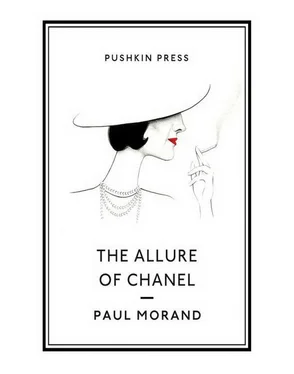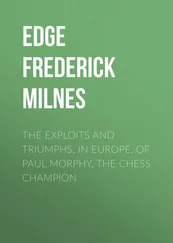On returning to my bedroom, I scribbled down a few notes from these St Moritz conversations and then thought no more about them; apart from the unforgettable picture of Misia, they were lost to my memory. Moving house in Switzerland last August, I chanced to come across these yellowing pages of thirty years ago. In the meantime, following her death, some very comprehensive books about Chanel had been published, a brilliant novel, as well as the sensitive memoir of a late friendship.
I enjoyed rereading my volatile pages, written on headed notepaper from the Badrutt’s Palace, then I felt like sharing my nostalgia with Pierre Berès; he pleaded with me to have them typed out; a slippery slope … Nothing was written by me; it was all by a ghost, but a ghost who, from beyond the grave, kept up a frantic gallop, her normal pace. Allure, in every sense of the word:1 the physical and mental rhythms, like the three speeds of a horse that riders refer to; and also, as in hunting, the pace of a stag, to indicate its trail, its course among the leafy boughs and the broken branches; Chanel passed this way, Chanel was there; thirty years is a great forest.
P M [1976]
1 In French the word ‘allure’, as well as having the sense that it has in English of attraction, charm and enticement, also denotes pace and speed of movement. [Tr]
IT IS NOT WITHIN VIEW of my native Puy-de-Dôme that I am speaking to you, this evening, it’s in St Moritz, overlooking the Bernina Pass; it’s not in our gloomy house where, one day, a proud and inscrutable little girl was taken in, without affection or warmth, that I begin telling you the story of my past life; it’s in a brightly lit hotel, where the rich take their pleasure and their laborious rest. But for me, in the Switzerland of today just as in the Auvergne of yesteryear, I have only ever found loneliness.
At the age of six, I am already alone. My mother has just died. My father deposits me, like a millstone, at the house of my aunts, and leaves immediately for an America from which he will never return. An orphan … ever since then, this word has always paralysed me with fear; even now I cannot go past a girls’ boarding school and hear people saying “they are orphans”, without tears coming to my eyes. Half-a-century has passed, but in the midst of the luxury and happiness enjoyed by the last happy people in a miserable world, I am alone, still alone.
More alone than ever.
These initial remarks are preceded by the word “Alone”; I would not write “Alone …”, I would not follow it with an ellipsis, as if to tint my isolation with a note of melancholy that is not in my nature; nor with an exclamation mark: “Alone!”, which would have had the pointless effect of appearing to challenge the world. I merely observe that I have grown up, lived, and am growing old alone.
It is loneliness that has forged my character, which is bad-tempered, and bronzed my soul, which is proud, and my body, which is sturdy.
My life is the story—and often the tragedy—of the solitary woman, her woes, her importance, the unequal and fascinating battle she has waged with herself, with men, and with the attractions, the weaknesses and the dangers that spring up everywhere.
Today, alone in the sunshine and snow … I shall continue, without husband, without children, without grandchildren, without all those delightful illusions, without all those delusions that make us believe that the world is inhabited by our other selves, to work and live ‘alone’.
EVERY CHILD HAS A SPECIAL PLACE, where he or she likes to hide, play and dream. Mine was an Auvergne cemetery. I knew no one there, not even the dead; I didn’t grieve for anyone; no visitor ever came there. It was a little, old country cemetery, with neglected graves and overgrown grass. I was the queen of this secret garden. I loved its subterranean dwellers. “The dead are not dead as long as we think of them,” I would tell myself. I became very fond of two unnamed tombs; these slabs of granite and basalt were my playroom, my boudoir, my den. I brought flowers there; on the humped mounds I devised hearts with cornflowers, stained-glass windows with poppies, citations with daisies. In between two mushroom-picking expeditions, I would bring my rag dolls on a visit, the ones I preferred to all the others because I had made them myself. I confided my joys and sorrows to my silent companions without disturbing their final rest.
I wanted to be sure that I was loved, but I lived with people who showed no pity. I like talking to myself and I don’t listen to what I’m told: this is probably due to the fact that the first people to whom I opened my heart were the dead.
There we are arriving at my aunts’ house, my father and I, at dusk. We are in deep mourning. My mother has just died. My two sisters have been sent to a convent. I, being the most sensible one, am entrusted to these aunts who are distant relations, my mother’s first cousins. When we get there, we are greeted half-heartedly; they cut the wick of the lamp to see my face more clearly. My aunts have had supper; we haven’t; they are surprised that people who have been travelling all day should not have eaten. This disturbs their routine and their household management, but eventually they overcome their harsh, provincial austerity and say reluctantly: “We shall cook you two boiled eggs.” Little Coco can sense their reluctance and is offended; she is dying of hunger, but at the sight of the eggs she shakes her head, she refuses them, she declines, she states in a loud voice that she does not like eggs, she loathes them; in actual fact, she loves them, but after this first meeting, on this dismal night, she needs to say no to something, to say no passionately to everything she is presented with, to the aunts, to everything around her, to the new life. During the ten years that she will spend in the Mont-Dore, little Coco will dig herself ever more deeply into her first lie, her stubborn refusal, until at last the undisputed legend—the first legend, which will be followed by so many more!—is given credence: “little Coco doesn’t like eggs”. Henceforth, whenever I am about to consume a fine mouthful of flambéed omelette, hoping that this myth concerning me will be forgotten, I shall hear my aunts’ caustic voices saying to me: “you know very well they are made of eggs”. Thus does the myth kill the hero.
I say no to everything, because of a fierce—too fierce—love of life, because of a need to be loved, because everything about my aunts irritates and upsets me. Horrible aunts! Adorable aunts! They belonged to that peasant bourgeoisie that never sets foot in town, or in their village, unless driven there by bad weather, for the winter, but which never loses touch with the earth that feeds them. Horrible aunts for whom love is a luxury and childhood a sin. Adorable aunts whose chimney place overflows with salted and smoked meats, dressers with salted butter or jams, cupboards with fine Issoire linen sheets, which our Auvergne hawkers sell all over the world. There is so much linen-ware in their house that they need only send it to the laundry twice a year. I know that people from the Auvergne are not supposed to be very clean, but compared to our well-worn bundles nowadays, it was a great deal of linen. Our servants wear pleated head-dresses, because from the age of fifteen they have cut off and sold their hair; it’s a custom that dates back to the Gauls; Roman women were already wearing our hair. I am sent to school and to catechism classes. I don’t learn a thing there. My knowledge would never have anything to do with what the teachers taught me; the God I believe in would not be the god of the priests. My aunt makes me recite my lesson; since she has forgotten her catechism, she looks in my book for her questions; I answer perfectly, and all the better because I have discovered another catechism in the attic and have torn out the pages one by one, and so can hide the passages I am being questioned about in the palm of my hand.
Читать дальше












